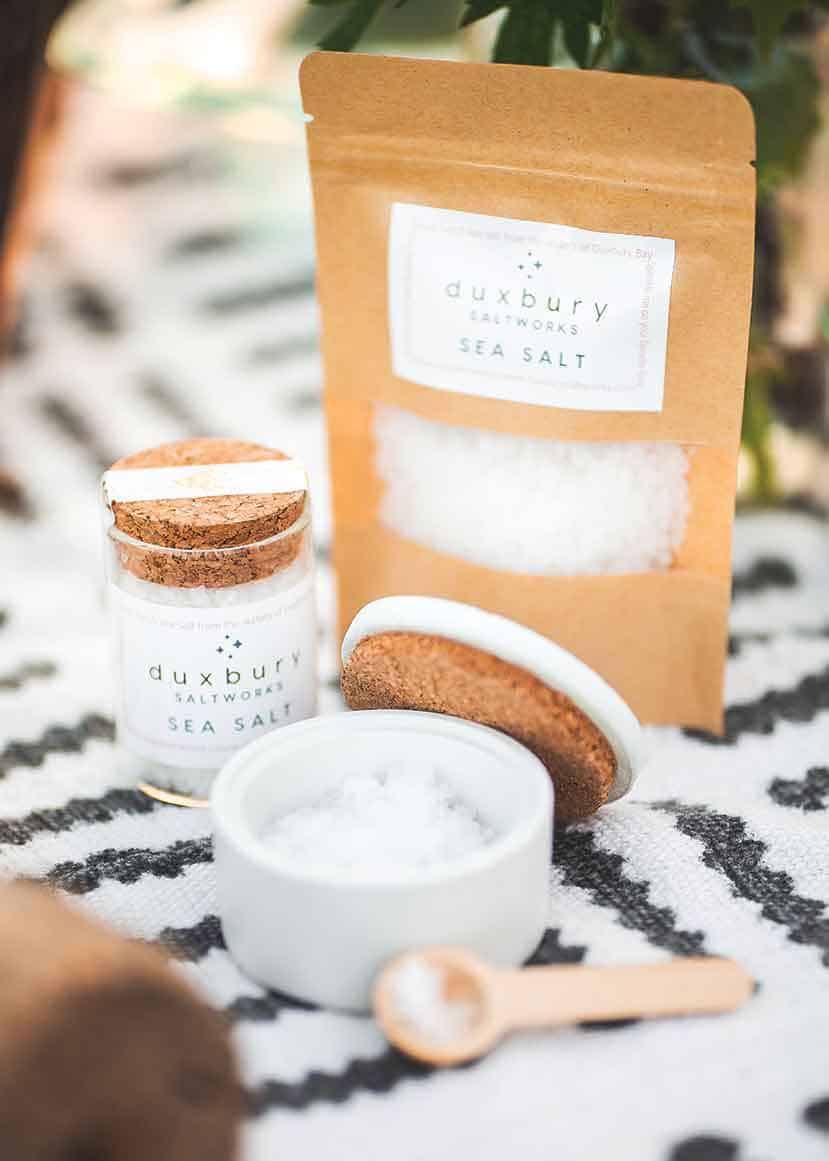Lily Leedom and her team at Duxbury Saltworks tap into one of the South Shore’s most obvious resources.
By Kelly Chase — Photography by Derrick Zellman
“There’s a long history of salt-making in this region and, of course, in the world, with the proliferation of oyster farms in Duxbury, I thought, why are we importing salt when we have it a few feet away from our homes?”

After wading knee-deep in the icy waters of Duxbury Bay, Lily Leedom found herself in her kitchen with a few gallons of sloshing ocean water. Like a chemist, she employed pots and pans from her cabinets and boiled the water until its most prominent mineral—salt—sunk like tiny stones to the bottom. She scooped up the flakes to create a miniature white mountain and tasted the results. Leedom repeated this process over and over until she found just the right texture and consistency for cooking.
Leedom is not a chemist or a chef, but she is an entrepreneur. In 2018, she and her husband, Timothy, who is originally from Duxbury, moved back east from Portland, Oregon, with their two young children. While on the West Coast, Leedom launched and ran a real estate business as well as a yoga mat company. “[Entrepreneurship] is like a wellspring from within me,” says Leedom. “There are boundless ideas and my inspiration comes largely from this place and the natural beauty of it.”

When the couple moved to Duxbury, Leedom fell in love with the region’s rich maritime history, and, after leaving a city known for its maker culture, she wondered what she could create in her newfound home. “There’s a long history of salt-making in this region and, of course, in the world,” says Leedom. “With the proliferation of oyster farms in Duxbury, I thought, why are we importing salt when we have it a few feet away from our homes?”
Leedom started making small batches of sea salt and sharing her product with family and friends. Her idea attracted the attention of a number of locally minded individuals and she soon had a roster of supporters and team-members (including Dana Hale, Katie White, Brooke Bradley, Inge Houghton, and Erika Upson) who helped transform her vision into a business. Leedom’s new company, Duxbury Saltworks, officially launched in the fall of 2018 and her product is currently available online and in a number of stores on the South Shore.
The process of making sea salt is time-consuming. After scraping the salt from the bottom of the pan, Leedom places it into a warming oven where it slowly roasts at a low temperature. “We worked hard to come up with the right consistency, which is fluffy and snow-like,” she says. The flavor is more powerful than table salt. Leedom suggests sprinkling the flaky crystals as a final touch to a meal, but they can be used for cooking and baking as well. “It’s a finishing salt, so it’s designed to really melt on your food,” she says.
The history of salt-making in the region goes back generations. Before refrigeration, salt was essential to preserving food like fish and meat, and from the mid-18th century and into the 19th century, a number of salt companies occupied the coastlines of the northeast, especially Cape Cod. In the book “Salt: A World History,” author Mark Kurlansky, reports that by 1837, the Cape “had 658 salt companies producing more than 26,000 tons per year.” However, the demand for salt was increasing at a rate that the Cape couldn’t keep up with and many of the region’s salt companies closed in the late-19th century and never reopened.
Today, Leedom is revisiting the viability of the abundant natural resource. Currently, Duxbury Saltworks operates out of a former farm on Bay Road close to the coast. For years, the old farm managed a stand at the end of its dirt driveway, and the land was originally part of the Howland Farm consortium, but in recent years the property fell into disrepair. When Leedom walked the land with her husband, she saw its potential. “People who live in the area remember how amazing this place used to be, but over the past several years it was let go,” she says. “It is a lot for somebody to maintain, so we bought the property with the intention to restore the land.” The added benefit is that the house on the property could serve as the launching pad for the business.
The property’s 10 acres include peach and magnolia trees that burst into bloom in the spring. On the ground, discarded oyster shells are scattered, a reminder of the land’s proximity to the sea. Leedom picks up the shells and places them into a bucket—she has another idea brewing. The setting, Leedom says, is ideal for farm-to-table dinners, which she and her team plan to initiate this fall. “There is a lot we can do with this piece of land and we are looking forward to the possibilities,” she says.
For now, Leedom and her team at Duxbury Saltworks are busy in the kitchen—boiling, producing and packaging local, organic sea salt into jars and salt cellars, which they hope will find its way onto more tables on the South Shore and beyond.
For more information, visit duxburysaltworks.com.


